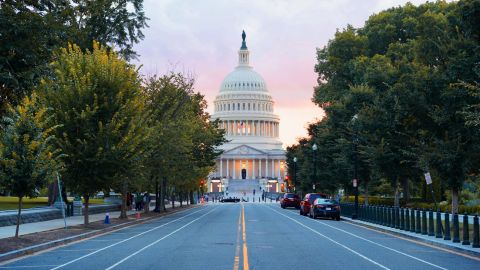The CHIPS and Science Act becomes law
President Joe Biden today signed into law the CHIPS and Science Act, which authorizes funding and policies to bolster American research and development and increase national science and technology competitiveness.
The act contains several provisions endorsed previously by the American Society for Biochemistry and Molecular Biology:
-
The Bioeconomy Research and Development Act of 2021 will help to unify and strengthen bioengineering efforts across U.S. agencies.
-
The Restore and Modernize Our National Labs Act originally proposed $6.1 billion to repair and modernize U.S. national laboratories. The final legislation authorizes $4 billion across fiscal years 2023 to 2027.
-
The STEM Opportunities Act will facilitate participation of historically marginalized groups in science, technology, engineering and math. Notably, the legislation contains language, for which the ASBMB advocated, to extend caregiving flexibilities to trainees, not only investigators awarded federal grants.
-
The Rural STEM Education Research Act supports rural communities’ access to STEM education and research through several mechanisms. The legislation includes the ASBMB’s preferred language expanding investments in the Established Program to Stimulate Competitive Research. This means that the National Science Foundation will increase the percentage of funds (to 20% from 13%) that go to emerging research institutions, many of which are in rural communities.
-
The majority of the MSI STEM Achievement Act was included in the legislation. It will increase capacity and infrastructure at minority-serving institutions of higher education, including historically Black colleges and universities and tribal colleges and universities.
-
The Combatting Sexual Harassment in STEM Act has funding for executing preventative measures and response frameworks for addressing sexual and gender harassment in STEM.
-
The ASBMB-endorsed language in the NSF for the Future Act will increase the number of graduate research fellowships and improve the NSF’s training policies by instating mentorship plans, career exploration and increased inclusivity.
How we got here
It has taken a lot of effort to get the CHIPS and Science Act over the finish line.
In June 2021, as the U.S. experienced increasing inflation and supply-chain deficiencies and fell behind in R&D globally, the U.S. Senate responded by passing the United States Innovation and Competition Act of 2021, also known as USICA.
This bipartisan bill combined multiple legislative efforts to strengthen the nation’s leadership in R&D by protecting American intellectual property with enhanced research security policies, robust scientific funding authorizations and investments in the STEM workforce.
In February, the U.S. House passed its version of the bill, the America Creating Opportunities for Manufacturing, Pre-Eminence in Technology, and Economic Strength Act of 2022, called COMPETES for short.
COMPETES expanded on the science provisions in USICA with strong bipartisan input and engagement with stakeholders from the science, education and industrial sectors. It also significantly differed from USICA by including provisions related to clean energy and trade provisions.
At the time, U.S. Rep. Frank Lucas, R-Okla., the ranking member of the House Science Committee, said in a statement how much he opposed the COMPETES Act but called for consensus between Democrats and Republicans: “While there are many flaws in USICA, I believe that we had a good opportunity to find a consensus agreement through a formal House and Senate Conference.”
In March, the ASBMB published a statement detailing its position on the two versions and endorsed several provisions that remain largely intact in the CHIPS and Science Act.
In April, the bill entered a bicameral conferencing process, during which a conferencing committee of 107 lawmakers would negotiate the more than 1,000 differences between USICA and COMPETES. The ASBMB shared its statement with the offices of those members.
During the ASBMB’s annual Capitol Hill Day in May, the society’s Public Affairs Advisory Committee strongly advocated for provisions in USICA and COMPETES that would modernize the infrastructure of national labs, strengthen the bioeconomy, and support the next generation of scientists.
Over the summer, the legislation faced many negotiation hurdles and political attacks. Yet more pressure stemmed from looming deadlines to pass incentives for semiconductor manufacturing before companies set up shop internationally. Communication began to break down among congressional and conferencing leaders.
Once concerns emerged that Congress would strip the pro-science provisions in the U.S. competitiveness legislation to meet the semiconductor deadlines, Senate Majority Leader Chuck Schumer, D-N.Y., agreed to a “test vote” on July 19 to assess support for a bill that had semiconductor manufacturing incentives and the pro-science provisions that had been successfully negotiated. That version of the legislation was called CHIPS+.
After a successful test vote, the ASBMB called for passage in the Senate on July 25. Notably, the ASBMB was one of many other scientific stakeholders that demonstrated their support for CHIPS+ upon the rapid arrival of the bill in both chambers.
The Senate passed the final iteration — the CHIPS and Science Act — on July 27.
“This is one of the most significant long-term thinking bills we’ve passed in a very long time,” Schumer said after the Senate vote. “Our grandchildren will hold good paying jobs in industries we can’t even imagine because of what we are doing right now and we did it together, both sides cooperating in good faith, on some truly difficult issues.”
The House passed the legislation the next day, and President Joe Biden signed it into law today.
Sudip Parikh, chief executive officer of the American Association for the Advancement of Science, called the CHIPS and Science Act “one of the most important pieces of science and technology legislation in a generation” and “a down payment on our future” to ensure America remains a world leader in scientific discovery and innovation.
Advocacy is effective
The scientific community played an important role in making the legislation a reality.
Sarina Neote, ASBMB’s director of public affairs, said: “The ASBMB applauds the work of congressional leadership and conferencing members who laid the groundwork for the (legislation). We also really appreciate all the time and effort our PAAC members have dedicated to advocating for the science workforce provisions in the final version of the bill. It’s important for scientists to make sure their voices are heard, and our committee members did exactly that.”
James Brown, executive director of the STEM Education Coalition, said in a statement: “Our future prosperity depends on our ability to lead the world in technology development, job creation in high demand technical fields, and our ability to train more Americans for the best, highest paying jobs in the global economy. We are delighted that so many members of both parties in the U.S. Senate have come together behind this goal.”
The next hurdle will be actual follow-through on the funding authorizations agreed to in the act. The scientific community will be watching the negotiations for FY23 appropriations closely.
Enjoy reading ASBMB Today?
Become a member to receive the print edition four times a year and the digital edition monthly.
Learn moreGet the latest from ASBMB Today
Enter your email address, and we’ll send you a weekly email with recent articles, interviews and more.
Latest in Policy
Policy highlights or most popular articles

Councilors advocate for science on Capitol Hill
ASBMB Councilors meet with their elected officials to advocate for basic scientific research funding and training the next generation of scientists.

Hope for a cure hangs on research
Amid drastic proposed cuts to biomedical research, rare disease families like Hailey Adkisson’s fight for survival and hope. Without funding, science can’t “catch up” to help the patients who need it most.

Supporting science through advocacy and community building
ASBMB calls on scientists to take action as funding cuts and policy shifts threaten the U.S. research enterprise, emphasizing the power of community advocacy and persistence in protecting the future of science.

Seven steps to advocating in your home state
Find out how to schedule, prepare for and conduct a productive district office meeting to communicate the importance of fundamental scientific research funding to your representatives.

ASBMB members call for funding and agency support amidst uncertainty
In 60 meetings on Capitol Hill, scientists urge legislators to reaffirm support for scientific innovation

Embrace your neurodivergence and flourish in college
This guide offers practical advice on setting yourself up for success — learn how to leverage campus resources, work with professors and embrace your strengths.

